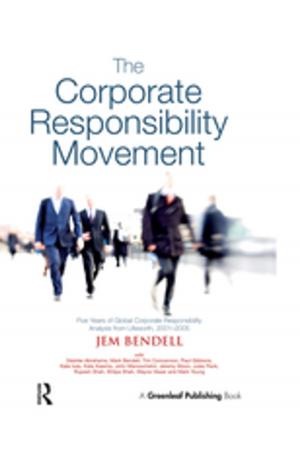Energy 2050
Making the Transition to a Secure Low-Carbon Energy System
Nonfiction, Science & Nature, Technology, Power Resources| Author: | Jim Skea, Paul Ekins, Mark Winskel | ISBN: | 9781136539985 |
| Publisher: | Taylor and Francis | Publication: | June 25, 2012 |
| Imprint: | Routledge | Language: | English |
| Author: | Jim Skea, Paul Ekins, Mark Winskel |
| ISBN: | 9781136539985 |
| Publisher: | Taylor and Francis |
| Publication: | June 25, 2012 |
| Imprint: | Routledge |
| Language: | English |
The United Kingdom is committed to reducing its greenhouse gas emissions by at least eighty per cent by 2050, a target that will only be achieved by transforming the way that energy is supplied and used. At the same time there are anxieties about the security of energy provision in terms of European dependency on natural gas and the reliability of electricity supply. This book explores in detail those factors which could help or hinder the attainment of the UK's climate change targets, and how these factors interact with the parallel objective of maintaining a robust and secure energy system. The book is the result of a major national energy research effort by the UK Energy Research Centre, which includes some of the UK's leading energy experts. The results and recommendations are essential reading for policymakers, professionals, researchers, and anyone concerned with achieving large-scale reductions in carbon emissions, both from the UK and internationally.
Energy 2050 begins by exploring the evolution of the UK energy system over recent decades: the trends, technologies and environmental impacts related to energy use, and the structures and institutions of governance that have influenced this evolution. It then moves on to changes in energy policy to emphasise decarbonization and resilience, and introduce the approach to scenarios and modelling used in the rest of the book. Later chapters explore different aspects of the uncertainties that may enable or constrain the creation of a low-carbon, resilient UK energy system, related to accelerated technology development, the creation of an infrastructure to support de-centralized energy and microgeneration, to lifestyle and behaviour change, and to public attitudes to wider environmental impacts associated with energy system change.
The United Kingdom is committed to reducing its greenhouse gas emissions by at least eighty per cent by 2050, a target that will only be achieved by transforming the way that energy is supplied and used. At the same time there are anxieties about the security of energy provision in terms of European dependency on natural gas and the reliability of electricity supply. This book explores in detail those factors which could help or hinder the attainment of the UK's climate change targets, and how these factors interact with the parallel objective of maintaining a robust and secure energy system. The book is the result of a major national energy research effort by the UK Energy Research Centre, which includes some of the UK's leading energy experts. The results and recommendations are essential reading for policymakers, professionals, researchers, and anyone concerned with achieving large-scale reductions in carbon emissions, both from the UK and internationally.
Energy 2050 begins by exploring the evolution of the UK energy system over recent decades: the trends, technologies and environmental impacts related to energy use, and the structures and institutions of governance that have influenced this evolution. It then moves on to changes in energy policy to emphasise decarbonization and resilience, and introduce the approach to scenarios and modelling used in the rest of the book. Later chapters explore different aspects of the uncertainties that may enable or constrain the creation of a low-carbon, resilient UK energy system, related to accelerated technology development, the creation of an infrastructure to support de-centralized energy and microgeneration, to lifestyle and behaviour change, and to public attitudes to wider environmental impacts associated with energy system change.















